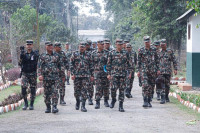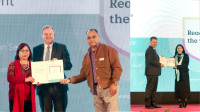National
Ethnic communities to hold a protest rally on World Indigenous Peoples' Day
The indigenous nationalities say the state is still reluctant to address their concerns of identify and inclusion.jpg&w=900&height=601)
Tika R Pradhan
Unlike in the past, the indigenous nationalities in Nepal are planning to observe the International Day of the World’s Indigenous Peoples on Friday on the streets as part of their ongoing protest against what they call a regressive state.
In the past, the Federation of Indigenous Nationalities (NEFIN), used to celebrate the international day on August 9 in Tundikhel with fanfare.
“Earlier we used to celebrate the International Day of the World’s Indigenous Peoples by organising various programmes,” said Jagat Baram, chairman of NEFIN. “But tomorrow [Friday] we will observe the day on the streets to protest against state’s regressive attitude.”
According to him, a protest rally would begin from Bhrikuti Mandap and converge at Maitighar Mandala, where rights activists and civil society leaders are set to address the assembly on how the Nepali state is still hostile towards the country’s indigenous people.
Nepal’s indigenous people, who have for long been fighting for their rights, say their struggle is not over yet, as their demands are yet to be fulfilled and even a powerful government is reluctant to implement the constitutionally guaranteed provisions of
inclusion.
“The state mechanism is trying to snatch away the achievements that were made in the past,” said Om Gurung, spokesperson of the Aadibasi Janajati Rastriya Andolan, a forum of 42 different rights organisations of the indigenous communities.
The forum, however, has largely remained inactive since the demise of Padma Ratna Tuladhar, a veteran indigenous rights activist.
“Even the partial achievements like proportional representation, inclusiveness, conservation of language and culture, special and autonomous regions are yet to be implemented.”
According to Gurung, the recent developments including some controversial bills, Public Service Commission vacancy notice and the Supreme Court ruling on the matter, and the mindset of people in power are indicative of how the state is still reluctant to address the concerns raised by the indigenous communities.
“With the demonstrations against the Guthi bill and the ongoing protests against the Public Service Commission, it seems the indigenous people are again trying to give momentum to their movement,” said Gurung.
NEFIN has been staging demonstrations in Kathmandu for the last one month to protest the vacancy notice that the Public Service Commission had published to hire around 9,000 staffers at the local level. NEFIN has objected to the vacancy notice, saying it is against the constitutional provision of inclusiveness.
The issues of identity and inclusion still top the agenda of the indigenous communities.
Even though some issues were incorporated in the new constitution, leaders of the indigenous movement say the state mechanism is still taking a regressive approach.
“We are lobbying with different sister wings of political parties, women, Muslim and other marginalised groups for a collective movement on our common issues,” said Baram.
Suresh Ale Magar, central member of the ruling Nepal Communist Party, who also leads the party’s indigenous front Indigenous Nationalities Federation, said the plight of the indigenous people still continues despite his erstwhile party CPN (Maoist Center) fighting a decade-long war for their rights. “Our party is dominated by anti-federal elements,” Magar told the Post.




 21.13°C Kathmandu
21.13°C Kathmandu














